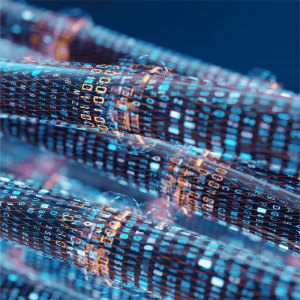Fiber Optic Communication Security: A Critical Technology for Protecting Sensitive Data
In the digital age, data security has become more critical than ever. Especially for organizations that work with sensitive information, such as financial services, healthcare, governments, and large corporations, data security should be a top priority. Fiber optic communication stands out with its security advantages as well as its high-speed and reliable data transfer. So why is fiber optic communication so secure and what are the advantages of this technology?
What is Fiber Optic Communication?
Fiber optic cables consist of thin glass or plastic fibers that transmit data as light signals. Fiber optic communication provides faster, more efficient and more secure data transmission over long distances thanks to the use of optical signals instead of electrical signals transmitted over copper cables. It has become an indispensable technology especially for large data centers, telecommunications companies and wide area networks (WAN).
Advantages of Fiber Optic Communication Security
- Resistance to Eavesdropping: Fiber optic cables are much safer than copper cables. Since they do not use electrical signals, they do not emit electromagnetic signals, which makes it almost impossible to physically eavesdrop on fiber optic cables. In case of any attempt to interfere, the signal in the cable is immediately cut off, making it easier to detect a security breach.
2. Reducing the Risk of Data Loss and Interference: Fiber optic cables are immune to electromagnetic interference, which greatly reduces the risk of data loss or interference. This provides a great advantage, especially in dense networks or environments with a large number of devices, where secure data transmission is critical.
3. Reliable Data Transmission Over Long Distances: Fiber optic technology provides reliable data transmission even over long distances. This is one of the main reasons why fiber optic cables are preferred in situations requiring intercity or cross-country data communication.
4. Privacy and Security: Fiber optic communication is widely used in applications requiring high security, especially in military and government communications. Fiber optic cables provide security during data transmission while protecting the confidentiality of sensitive information.
5. Stronger Physical Security: Fiber optic cables provide stronger physical security than copper cables. These cables are much more difficult to physically cut or interfere with, which is an important factor that increases security.
Additional Measures That Can Be Taken for Fiber Optic Communication Security
Despite the inherent security advantages of fiber optic cables, it is always important to take additional security measures. Below are some additional measures that can be implemented to further increase fiber optic communication security:
- Comprehensive Monitoring and Detection Systems: Comprehensive monitoring and detection systems should be used to ensure the security of fiber optic networks. These systems instantly detect possible interventions or cuts to the cables, enabling rapid intervention.
2. Data Encryption: Strong encryption methods should be used to secure data transmitted over fiber optic cables. This prevents data from being accessed by unauthorized persons during transmission and increases data security.
3. Firewalls and Network Security Systems: Using firewalls and network security systems around the fiber optic network provides additional protection against both external and internal threats.
4. Regular Maintenance and Inspections: Regular maintenance and security inspections of your fiber optic infrastructure help detect and eliminate potential security vulnerabilities. This ensures the continuous security of the infrastructure.
The Future of Fiber Optic Communication Security
Fiber optic communication will continue to be one of the most important technologies in the future for secure data transmission. Developing technologies and increasing data security needs will allow fiber optic cabling to be further developed. In particular, with the widespread use of the Internet of Things (IoT), 5G and smart city infrastructures, fiber optic communication security will play a critical role.
In addition, with the increase in cybersecurity threats, the security of fiber optic networks will become even more important for data centers and businesses. Businesses will need to invest in the latest technologies to protect their data and take the necessary steps to ensure fiber optic communication security.
Conclusion
Fiber optic communication is a technology that provides superiority in terms of both speed and security. Ideal for applications requiring high security, this technology offers advantages such as resistance to eavesdropping, immunity to electromagnetic interference, and reliable data transmission over long distances. Taking additional measures such as encryption, monitoring systems, and network security solutions to increase fiber optic communication security will further strengthen your data security.
If you want to increase your business’s data security and learn more about fiber optic communication solutions, you can contact our expert team. We can help you protect your sensitive data with reliable and high-performance network infrastructures.






